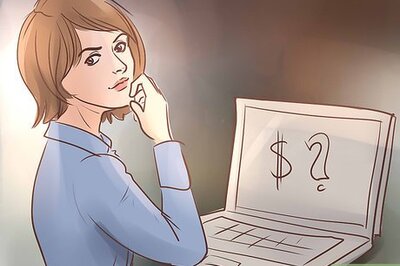
views
What does “hurkle durkle” mean?
“Hurkle durkle” is a Scottish word meaning to lie around in bed. When you stay in bed long past the time you should be up and about, you’re “hurkle-durkling.” The Scottish term is similar to “bedrotting,” but hurkle durkling typically refers to staying in bed for leisure, versus bedrotting, which refers to staying in bed for an extended period of time because you feel unable to get up or are in need of extended rest due to burnout. While bedrotting typically means lying in bed all day or all weekend (or all year, à la My Year of Rest and Relaxation), hurkle-durkling usually involves lounging in bed for a short time after waking up.
Why do people hurkle-durkle?
Hurkle-durkling is relaxing and luxurious. A cozy morning wrapped in your favorite blanket, maybe with a cup of coffee, reading a book or scrolling Instagram? It's no wonder "hurkle-durkle" has taken social media by storm. Spending a few extra minutes or hours in bed can be a fun change of pace now and again, especially on a morning after a long, hard week of work when you know you don't have anything pressing to tend to.
“Hurkle Durkle” Origins
The first recorded usage of hurkle-durkle was from 1808. The first recorded appearance of the term was in 1808 in An Etymological Dictionary of the Scottish Language. “Hurkle” means “to draw the body together,” but it’s uncertain what “durkle” means or how the two began being used together. “Hurkle-durkle” may have come from the dialect spoken in Fife, a peninsula in eastern Scotland. “Hurkle-durkle” is a form of rhyming reduplication, a linguistic characteristic also seen in words like “harum-scarum,” “hocus-pocus,” “helter-skelter,” and “higgeldy-piggeldy.”
The term took off on TikTok with a post by singer and actress Kira Kosarin. On January 9, 2024, American singer and actress Kira Kosarin posted a TikTok video in which she defined the term and said, “I do be hurkling and I do be durkling, and once I’ve hurkled my last durkle in a given morning, I will get up.” The video took off, and “hurkle-durkle” became one of the top words of 2024. Following Kosarin’s successful TikTok, a hit tweet by author Susie Dent defining the term “hurkle-durkle” went viral with over 1,000,000 views and 16,000 likes.
Is hurkle-durkling good for you?
Hurkle-durkling can be a great way to get some self-care. Starting the day in a state of relaxation can set the tone for the rest of your day, making it more peaceful and helping you feel more in control—after all, if you’re “supposed” to wake up at 7 but you stay in bed until 8, it can give you a sense of increased agency and help you feel in charge of your own time. However, giving into the urge to hurkle-durkle every day because you don’t want to go to work can make you feel worse and like you have less control. If you’re hitting the “snooze” button every day, ask yourself if you’re getting enough sleep.
Hurkle-durkling can mess with your sleep cycle. It’s best to hurkle durkle in moderation, since lounging for a long time in bed can make it more difficult to fall asleep and stay asleep. The average person needs between 7 to 9 hours of uninterrupted sleep a night, but hurkle durkling could result in polyphasic sleep, a sleep-wake pattern in which you keep sleeping and waking repeatedly in short shifts—for instance, you might sleep for 3 hours, wake for 1 hour, then sleep for another 2 hours and not get restful sleep. Polyphasic sleep can be exacerbated by frequent internet use, since the bright blue light and dopamine hits of social media can keep you glued to the screen when you should be sleeping. Hurkle durkling too much can lead to an increased risk of dementia, memory loss, Alzheimer’s, Parkinson’s disease, and stroke.


















Comments
0 comment